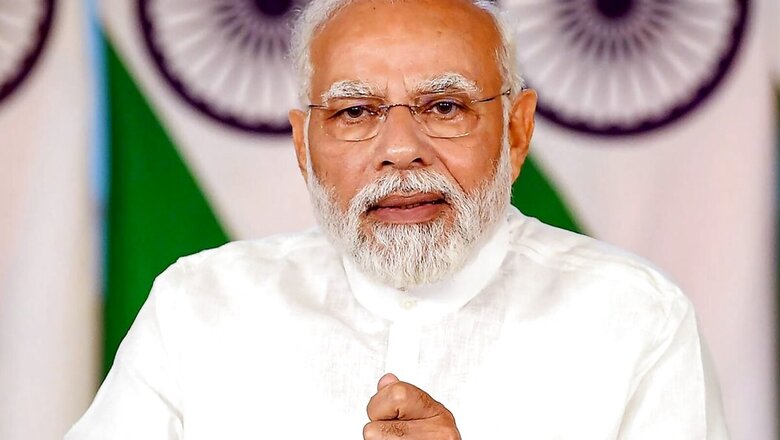
views
India has formally committed to reduce the emission intensity of its GDP by 45% by 2030 (from 2005 level) and meet 50 % of its cumulative electric power installed capacity from non-fossil fuel-based energy resources by 2030.
The updated Nationally Determined Contributions (NDCs) were approved by the Cabinet on Wednesday, taking ahead the announcement made by Prime Minister Narendra Modi at COP26 held in Glasgow last year.
The revised NDCs will now be communicated to the United Nations Framework Convention on Climate Change (UNFCCC).
With this, the country has reiterated its long-term goal of reaching net-zero by 2070. The decision on enhanced NDCs demonstrates India’s commitment at the highest level for decoupling of economic growth from greenhouse gas emissions, said the Cabinet.
“The updated NDC has been prepared after carefully considering our national circumstances and the principle of common, but differentiated responsibilities and respective capabilities (CBDR-RC),” said the government spokesperson. “India’s updated NDC also reaffirms our commitment to work towards a low carbon emission pathway, while simultaneously endeavouring to achieve sustainable development goals.”
The NDCs do not bind it to any sector specific mitigation obligation or action. The goal will be to reduce overall emission intensity and improve energy efficiency of its economy over time and at the same time protecting the vulnerable sectors of economy and segments of our society.
The country had upped its previous targets. In its previous submission of intended NDCs to UNFCC in October, 2015, the government had enlisted eight goals. Three of them had quantitative targets upto 2030 namely, cumulative electric power installed capacity from non-fossil sources to reach 40%; reduce the emissions intensity of GDP by 33 to 35% compared to 2005 levels and creation of additional carbon sink of 2.5 to 3 billion tonnes of CO2 equivalent through additional forest and tree cover.
CRUCIAL CLIMATE FINANCE
India has also pressed upon the need for climate finance, and highlighted that it will require its due share from such international financial resources and technological support.
“India’s climate actions have so far been largely financed from domestic resources. However, providing new and additional financial resources as well as transfer of technology to address the global climate change challenge are among the commitments and responsibilities of the developed countries under UNFCCC and the Paris Agreement,” the Cabinet said.
Delivering the National Statement at the @COP26 Summit in Glasgow. https://t.co/SdKi5LBQNM— Narendra Modi (@narendramodi) November 1, 2021
The decision taken on Wednesday also takes forward the PM’s announcements regarding sustainable lifestyles and climate justice to protect the poor and vulnerable from adverse impacts of climate change.
The updated NDC will be implemented over the period 2021-2030 through programs and schemes of relevant Ministries /departments and with due support from States and Union Territories.
According to the government, the Net Zero target by 2030 by Indian Railways alone will lead to a reduction of emissions by 60 million tonnes annually.
Similarly, India’s massive LED bulb campaign is reducing emissions by 40 million tonnes annually.
Read all the Latest News and Breaking News here




















Comments
0 comment